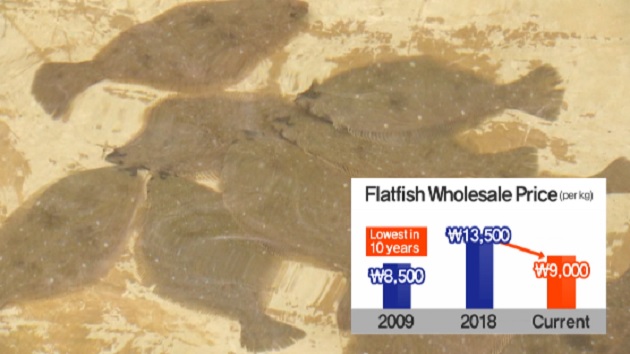
Prices of farmed flatfish grown in Jeju have plunged below the break even point. Insiders say the sector is facing its greatest crisis in a decade. Mike Balfour reports.
[slug]
Hallim-eup, Jeju City
At a flatfish farm in Hallim-eup, Jeju City, farmers are sorting fish by size.
Shipments of the fish have fallen short of farmers' expectations this year. The water tank is full of fish.
[slug]
Consumption began falling last fall
Flatfish growers say consumption of the fish has sharply dropped since last fall. Prices have also fallen.
--pip------------------
The cost of the fish was set at 13,000 won per kilogram last year. This year the price has fallen to 9,000 won.
This is the lowest since it plunged to 8,500 won ten years ago.
To make things worse, cost of production has soared to 11,000 won per kilogram. Farmers are now operating at a deficit.
--pip------------------
INTERVIEW
Kim Chang-yoon / Flatfish farmer
The monthly wage for a new worker was between 700,000 and 800,000 won ten years ago. It has soared to 1.8 million won. Payroll and feed have gotten more expensive, but fish prices have fallen. A number of fish farmers will go bankrupt within a year if things don't change.
<인터뷰 : 김창윤/광어 양식장 운영>
"10년 전만 하더라도 (인건비가) 초보는 70-80만 원, 지금은 180만 원 이렇게 줘야 합니다. 인건비 오르지 사료비 오르지 방어 값은 떨어지지 앞으로 이렇게 1년만 더 가면 제 생각에는 부도날 양어장이 많다고 봅니다. "
[slug]
Flatfish consumption falls as economy weakens
The National Federation of Fisheries Cooperatives says that flatfish consumption has significantly decreased as the economic recession affects restaurant business.
[slug]
Orders from restaurants, large retailers plummet
The quantity of fish ordered has decreased by 30 percent from restaurants and 40 percent from big supermarkets, compared with the previous year.
INTERVIEW
Han Yong-seon / National Federation of Fisheries Cooperatives
The recently amended labor act limits the number of overtime hours. Restaurants cannot stay open late as kitchen staff have to leave. This has a direct impact on flatfish consumption.
<인터뷰 : 한용선/제주어류양식수협 조합장>
"주방장들을 근로 시간 안에 운영하다 보니까 일식집 같은 경우는 늦은 시간까지 근무를 해줘야 하는데 이게 그렇지 못하다 보니까 이런 문제점들이 광어 소비에도 바로 영향을 미치고 있습니다."
[slug]
Imported fish becoming more popular
Customs-free salmon from Norway, which is easy to prepare, occupies 40 percent of the raw fish market nationwide.
Japanese farmed yellowtail fish is also popular.
[slug]
‘National government must protect flatfish sector’
The National Federation of Fisheries Cooperatives is taking steps to alleviate the problem by increasing deliveries of the fish to processing plants for markets and army meals.
It has also petitioned the government for industry protection several times.
On average, 23,000 tons of farmed flatfish is produced each year in Jeju.
[Reporter] Mike Balfour
[Camera] Park Byeong-june
[CG] Jeong Jae-kyung
Local flatfish growers are going through the hardest times in ten years.
Mike Balfour, KCTV






